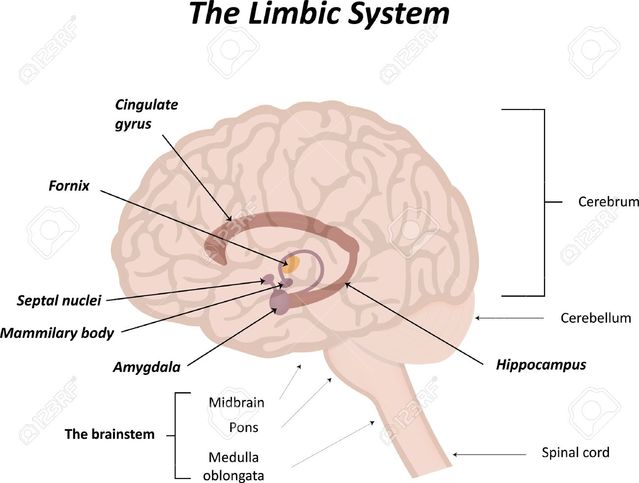

Did you ever wonder why we sometimes experience emotions and can’t identify what caused us to experience them? We’re just going through our day and suddenly feel depressed, or anxious, but nothing significant happened. Usually, but not always, we feel emotions as a result of some experience, whether it is happening now or is a memory of a past experience. Feeling them is not something we have control over but interpreting them is. The thought process that takes place around the experience of an emotion quite possibly can increase or decrease its intensity and influence our behaviors that follow. Our judgement of the thought process that follows an emotion can influence whether we accept the emotion and interpretation or whether we adjust the interpretation and try to influence the emotion being experienced. When we struggle with depression or anxiety it’s difficult to restructure our thinking to have a positive outcome. There are areas of our brain that remember emotional experiences, whether positive or negative, and these memories have both a conscious and unconscious effect on future experiences.
When we are young our emotions tend to be more of a response to something happening in the here and now, but as we age the experience of emotions are based on an interaction of current experiences and emotional memories of similar experiences from the past.
An example of this is when a child is learning about how to approach a dog. If the dog is playful, fun, and affectionate they have a positive experience and their pleasure center signals their brain to record this experience positively. If the dog is aggressive and scares the child then the anxiety center signals the brain to record this as something to avoid. This can, consciously or unconsciously, effect how they relate to dogs throughout the rest of their life. Future exposure to dogs will reinforce the pleasurable, or anxious, experience and with the accumulation of experiences their reaction becomes more complex. These complex feelings can trigger thoughts that influence how they behave when they encounter a dog. They may learn that approaching a dog can cause them to be anxious but if they had a good experience with a dog by letting it come to them and sniff their hand before approaching the dog then they learn that this is a way to interact that can result in relief of the anxiety and induce a positive feeling. They can then interpret the dog’s response and decide whether to avoid the dog, or not.
The area of the brain responsible for our emotions and emotional memory is concentrated, for the most part, in the Limbic System. Structures within the Limbic System that are important in this process are the Amygdala, the Septal Nuclei, and the Hippocampus. The Amygdala is active in relation to anxiety provoking stimuli. The Septal Nuclei are active in response to pleasurable stimuli. The Hippocampus records the memory associated with the emotions. Struggling with anxiety can be related to a hyperactive Amygdala and struggling with depression can be related to underactive Septal Nuclei.

The memories recorded by the Hippocampus are multidimensional- in that the action taking place, such as the dog being aggressive, is recorded along with less relevant details from the environment. An example of this is 9/11/2001. On the day of that horrible event the sky was bright blue. For many New Yorkers a bright blue sky on a fall day can cause anxiety without fully understanding why. Eventually something may trigger your memory to recall the events of that day and the anxiety, that something horrible is going to happen, can be decreased by remembering that the feelings being experienced are related to the past event and not the current situation.
I have been working with a woman for many years that first came to meet with me on a referral from her psychotherapist. She was in her third year of college and the year before I met with her, her father died. She was grieving and having difficulty functioning. She had a history of depression that responded to medication in the past and a strong family history of depression.
Over a three month period, with trials of two medications and adjusting doses, we found a regimen that worked. She had significant improvement with minimal side effects. Over the years that I have been working with her we would attempt to stop the medication but her depression would return and eventually we would need to restart it.
She became pregnant with her first child about 5 years ago. When she found out she was pregnant we spoke about the risks and benefits for herself, and the baby, if she stayed on the medication. She brought her husband to two of our sessions to discuss the medications and we also spoke with her obstetrician. She, and her husband, decided that she would continue the medication during her pregnancy. Everything went well. She had a baby girl, and did not struggle with any depression or post-partum depression.
Three years ago her mother was diagnosed with terminal cancer and she passed away within a few months. My patient went through an understandably difficult time and we did need to adjust her medication to help her get through it.
Earlier this year she came in and told me she was pregnant. She and her husband were ecstatic and again decided to stay on the medication throughout the pregnancy. A few months into the pregnancy she came to meet with me and seemed to be struggling. She wasn’t experiencing her previous symptoms of depression but described feeling sad and some existential feelings that nothing had any importance. The symptoms started about a month earlier. They were not there all the time and she was experiencing a familiar lack of energy that she had with her first pregnancy. We discussed adjusting her medication but we were reluctant to do that during her pregnancy. We agreed that we would adjust them if we needed to but didn’t want to risk any harm to the baby.
We reviewed her chart to see what she responded to in the past and I came across my note that this month, three years ago, was when her mother was diagnosed with cancer. She knew she felt down every year around the anniversary of her mother’s death but this time of year didn’t seem to affect her.
We spoke about her mother, she was tearful throughout the session, and together we decided to continue the medication as is and she would go back into psychotherapy, which she had not been in for the past year. We planned to meet in a month and if she was still struggling we would make an adjustment then.
The next time we met she was still sad but did not have that existential despair. She spoke about her mother and how much she missed her. She would often think about how her mother would never meet her baby and was sad but not depressed. She seemed to be working through her sadness and grieving and understanding them helped her get through the situation. She said she came to the conclusion that it was a good thing that she felt sad because it meant that she missed her mother and she felt lucky to have had a mother that she would miss. We decided to keep the medications the same as they were. The pregnancy went well and she had another little girl.
Our brains are extremely complex organs that are hard wired to help us develop and learn. Our emotions are responses to changes in our environment that lead to memories being formed and the more memories formed the more complex our emotional life becomes. Hopefully, as we age, we learn more about ourselves and our reactions to stimuli, whether conscious or unconscious.
Struggling with depression or an anxiety disorder has an effect on our whole body. They cause physical, as well as emotional, distress. It's okay to be sad (that part we can't control) and sometimes there is a good reason that we can understand. It's partly a function of our brains, of the interplay of experience and memory. That's why therapy is so important. This is one of the many reasons that psychotherapy plays such an integral role in treatment.
Emotions are a part of who we are and who we become. They are necessary for our survival as an individual and as a species. We all experience positive and negative emotions and we all differ in sensitivity of how we respond and what level of intensity our responses take. It’s important to experience all of them, both good and bad, to understand them, treat them if needed, and tolerate the experience of them when treatment is not indicated.
References
Buchanan, T. W. (2007). Retrieval of emotional memories. Psychological Bulletin, 133(5), 761-779.
Current Opinion in Neurobiology 2004, 14:198–202Human emotion and memory: interactions of the amygdala and hippocampal complex Elizabeth A Phelps
A specific role for hippocampal mossy fiber's zinc in rapid storage of emotional memoriesLearn. Mem. April 16, 2014 21: 287-297



